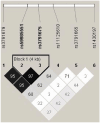Replication study identified EFEMP1 association with varicose vein predisposition among Indians
- PMID: 38609985
- PMCID: PMC11015598
- DOI: 10.1186/s40001-024-01786-8
Replication study identified EFEMP1 association with varicose vein predisposition among Indians
Abstract
Background: Varicose vein is a chronic condition that affects the lower extremities of the human body. Several factors have been implicated in the development of this disease, viz age, gender, weight, height and prolonged standing. Recently, genome-wide studies have identified genetic biomarkers that are associated with varicose veins in different ethnic groups. Such genetic studies are lacking in South Asians specifically in Indians where the prevalence of varicose veins is high, and it is important to replicate these variants in the stated population. The study aimed to replicate the association of genetic variants associated with varicose veins in this target population, which were found to be associated with the other ethnic groups.
Methodology: The studied cohort is of the Indian population comprising unrelated 104 varicose veins cases and 448 non-varicose vein controls. The samples were genotyped using the Illumina Global Screening Array. Using the genomic data from UK BioBank and 23andMe studied cohorts; eight genetic variants were selected to replicate in our dataset. The allelic association was performed to identify the effective allele and risk was estimated using odds ratio and p-value as level of significance. Multifactor Dimensionality Reduction was used to estimate the cumulative effect of variants in Indians.
Result: Variant rs3791679 of EFEMP1 was found to be associated with varicose veins in Indians. After observing the association of the EFEMP1 with varicose veins, we further ensued to identify all genetic variants within EFEMP1 to uncover the additional variants associated with this trait. Interestingly, we identified six new variants of EFEMP1 gene that have shown association. Moreover, the cumulative effect of all associated variations was estimated and the risk was 2.7 times higher in cases than controls whereas independently their effect ranges from 0.37-1.58.
Conclusion: This study identifies EFEMP1 as a potential gene related to the risk of varicose veins in Indians. It also highlights that evaluating the maximum number of variants of a gene rather than focusing solely on replicating single variations offers a more comprehensive and nuanced understanding of the genetic factors contributing to a complex trait like varicose veins.
Keywords: EFEMP1; Genotyping; Indians; Varicose veins.
© 2024. The Author(s).
Conflict of interest statement
The authors declare that they have no known competing financial interests or personal relationships that could have appeared to influence the work reported in this paper. Additionally, it is important to note that Dr. Anuka Sharma, Love Gupta, Garima Rastogi, and Dr. Varun Sharma are affiliated with NMC Genetics India Pvt. Ltd., serving as its employees, for the purpose of disclosure.
Figures
Similar articles
-
Interactive and evolutionary effect of CASZ1 gene variants on varicose veins susceptibility in South Asian Indians.Biol Res. 2025 Mar 19;58(1):17. doi: 10.1186/s40659-025-00599-1. Biol Res. 2025. PMID: 40108671 Free PMC article.
-
Endovascular radiofrequency ablation for varicose veins: an evidence-based analysis.Ont Health Technol Assess Ser. 2011;11(1):1-93. Epub 2011 Feb 1. Ont Health Technol Assess Ser. 2011. PMID: 23074413 Free PMC article.
-
Clinical and Genetic Determinants of Varicose Veins.Circulation. 2018 Dec 18;138(25):2869-2880. doi: 10.1161/CIRCULATIONAHA.118.035584. Circulation. 2018. PMID: 30566020 Free PMC article.
-
A Comprehensive Review on Varicose Veins: Preventive Measures and Different Treatments.J Am Nutr Assoc. 2022 Jul;41(5):499-510. doi: 10.1080/07315724.2021.1909510. Epub 2021 Jul 9. J Am Nutr Assoc. 2022. PMID: 34242131 Review.
-
Nonthermal Endovenous Procedures for Varicose Veins: A Health Technology Assessment.Ont Health Technol Assess Ser. 2021 Jun 4;21(8):1-188. eCollection 2021. Ont Health Technol Assess Ser. 2021. PMID: 34211617 Free PMC article.
Cited by
-
Interactive and evolutionary effect of CASZ1 gene variants on varicose veins susceptibility in South Asian Indians.Biol Res. 2025 Mar 19;58(1):17. doi: 10.1186/s40659-025-00599-1. Biol Res. 2025. PMID: 40108671 Free PMC article.
References
-
- Wang M, Sharma AK. Varicose veins. J Radiol Nurs. 2019;38(3):150–154. doi: 10.1016/j.jradnu.2019.04.004. - DOI
MeSH terms
Substances
Supplementary concepts
LinkOut - more resources
Full Text Sources
Molecular Biology Databases
Miscellaneous


